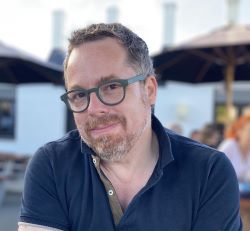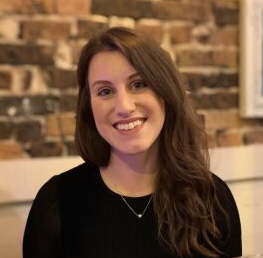Current NFC Administration and Fellows
The Northrop Frye Centre welcomes scholars from a wide variety of disciplines, areas of study, and experiences. Our Doctoral, Undergraduate, and Visiting Fellows contribute to the rich academic life of Victoria College.
Administration
Professor Robert Davidson, PhD (Cornell)
Director, Northrop Frye Centre
Bob Davidson is Professor of Spanish and Catalan Studies at the University of Toronto. He is the author of Jazz Age Barcelona (U of Toronto Press, 2009; shortlisted for the Canada Prize in the Humanities) and The Hotel: Occupied Space (U of Toronto Press, 2018). His current work includes a study of material culture and early 20th-century Spanish and Catalan narrative (By and About Things) and a new research project entitled The Scent of Spain: Fragrance, Odour and Culture that considers key fragrances and scents that contributed to the Spanish olfactory environment from the beginning of the modern fragrance industry in the country to the early 2000s.
He is the founder and co-editor of UTP’s Toronto Iberic book series and has published work on different aspects of the Castilian and Catalan avant-gardes, cultural theory and film. In addition to directing the NFC, Prof. Davidson currently serves as Chair of the Manuscript Review Committee of University of Toronto Press. He takes his martini with a little extra vermouth and an olive.
Email: robert.davidson@utoronto.ca
Kelly Baron, PhD (Toronto)
Special Projects & Events Coordinator (Research)
Kelly Baron has a PhD in contemporary Canadian Literature from the University of Toronto's Department of English. She's a regular reviewer for Literary Review of Canada, and her scholarly work can be found in Canadian Literature, Studies in Canadian Literature, and English Studies in Canada, among others. With Andrew DuBois, she's co-editing Sing in Me, Oh Muse: Music In/As Literature (Bloomsbury, 2025). Her research interests are in contemporary Canadian Literature, Canadian book culture, literary audio, and the connections between music and literature.
Email: nfc@utoronto.ca
Doctoral Fellows
The Northrop Frye Centre Doctoral Fellows are doctoral students registered in the Faculty of Arts and Science at the University of Toronto who are in the writing stage of their dissertation. In addition to mentoring undergraduate students and engaging with the intellectual community at Victoria College, the Doctoral Fellows present a public seminar on their doctoral research.
Stephanie Borkowsky (Department of History)
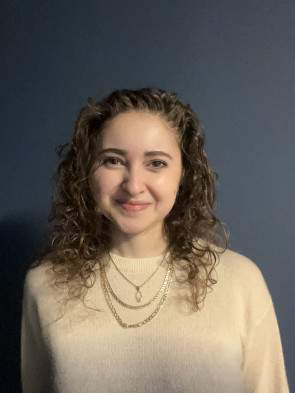
Supervisor: Daniel Bender
Stephanie Borkowsky (she/her) is a PhD candidate in the Department of History with a collaborative specialization in Food Studies. Her dissertation examines the lives of wet nurses in 19th century United States history, tracing how these women navigated the institutions, relationships, and social beliefs which shaped their experience of motherhood and (un)freedom. Stephanie is the former President of the Graduate Association for Food Studies and current Managing Editor at Gastronomica. She holds a BA in History from McGill University and an MA in Food Studies from New York University.
Email: stephanie.borkowsky@mail.utoronto.ca
Qi Hong (East Asian Studies)
Supervisors: Yurou Zhong (East Asian Studies); Nathan Vedal (East Asian Studies)
Qi Hong is a Ph.D. candidate in East Asian Studies with a collaborative specialization in Book History and Print Culture. Their dissertation explores the science, aesthetics, and politics of “linguistic sound” in China in the 19th and 20th centuries. Situated at the intersection of literary studies, book history, and the history of science and technology, this study aims to historicize linguistic concepts and experiments, as well as their reception within the broader intellectual community of late Qing and Republican China. Ultimately, Qi is interested in different ways to grapple with sound, sign, and sense amid radical shifts of knowledge and social paradigms.
As a translator and printmaker, Qi enjoys ruminating on and playing with the materiality of translingual communication. Her ongoing creative project combines printmaking and rapping to interrogate the politics of music and print culture under racial capitalism.
Email: qi.hong@mail.utoronto.ca
Bill Kroeger (Department of English)

Supervisor: Andrea Most
Bill Kroeger (he/him) is a PhD candidate of English (including a collaborative specialization with the School of the Environment). He studies calls to ecological conscience in different literary genres – from novels and poetry to films and protest documents. Engaging with Robin Wall Kimmerer’s Braiding Sweetgrass as origin story, science writing, ecological theory, and personal memoir, he focuses on ethics of ecology and relation in contemporary novels such as The Overstory and Barkskins, the poetry of Whitman, Mary Oliver, Joy Harjo, and Jorie Graham, films (both documentary and narrative), and local environmental protest literature defending U of T’s own “Back Campus.” Bill’s work with Earthsongs, a community gardening and poetry project, seeks to mix material experiences of plants, soil, and food with poetic reimagination of earth-relations, stewardship, and, interspecies communities.
Email: bill.kroeger@mail.utoronto.ca
Robbie Steele (Department of English/Book History and Print Culture)
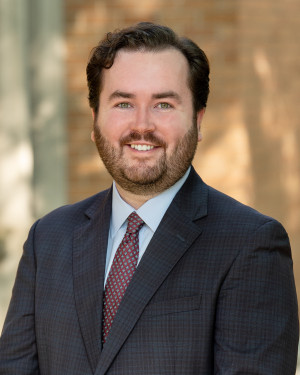
Supervisor: Daniel Wright
Robert (Robbie) Steele is a PhD candidate in the Department of English and the Collaborative Program in Book History and Print Culture at the University of Toronto. His SSHRC-funded dissertation analyzes how illustration-text dynamics in the Victorian illustrated novel function as a nexus for queer expression and interaction, especially in their complications of narrative time and the embodied experience of reading. He is also a Junior Fellow at Massey College and a former BHPC Printing Fellow in Massey College’s Robertson Davies Library, where he has recently curated an exhibition entitled Unbound: Queerness and the Book Arts, 1850–1987. He is excited to engage with the vibrant interdisciplinary community at the Northrop Frye Centre.
Email: r.steele@mail.utoronto.ca
Connor Bennett (CSUS/NFC Doctoral Fellow)
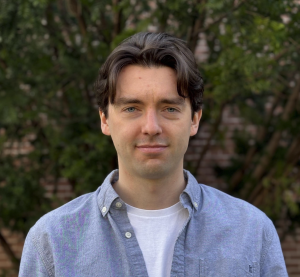
Supervisor: Michael Cobb
Connor Bennett (he/him) is a PhD Candidate at the University of Toronto’s Department of English. His dissertation, which has been supported by a Joseph-Armand Bombardier Canada Graduate Scholarship from the Social Sciences and Humanities Research Council of Canada as well as an Ontario Graduate Scholarship, is titled “Quiet Discontent: Minimalism and Melancholia in American Fiction, 1945–2025.” In it, he shows how practitioners of literary minimalism—a style of short and simple sentences, structural fragmentation, and ellipsis—register and respond to the faltering of American idealism during the postwar era. He argues that American literary minimalists use style as a means through which to reimagine both that idealism and, in turn, “Americanness” itself. His article based on the dissertation’s opening chapter (“Raymond Carver’s Minimalist Mouth-Work”) was recently published in ELH: English Literary History. In 2023, he co-edited an essay collection called “Minimalisms Now: Race, Affect, Aesthetics” for Post45 Contemporaries. Connor is also Co-Convener of the American Literature Research Collaborative, which promotes the study of American literature and literary cultures among undergraduates, graduates, and faculty from across the university.
Email: connor.bennett@mail.utoronto.ca
Kanika Lawton (CSUS/NFC Doctoral Fellow)
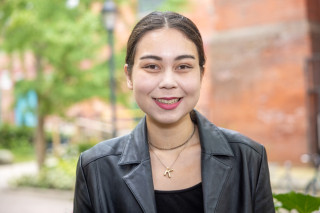
Supervisor: Meghan Sutherland
Kanika Lawton (they/them) is a PhD candidate at the Cinema Studies Institute, where they are also part of the Collaborative Specialization at the Mark S. Bonham Centre for Sexual Diversity Studies. They hold an MA from the Cinema Studies Institute and a BA in Psychology with a Minor in Film Studies from the University of British Columbia. Their intellectual interests coalesce around a broader investment in theorizing and historicizing socio-cultural, political, and aesthetic shifts in a post-9/11 United States through close attention to what they term “surveillant media," as well as an ethical commitment to those most disproportionately impacted by the snowballing effects of U.S. security and surveillance apparatuses. Subsequently, their SSHRC-funded dissertation puts forth a two-pronged claim: neutrality is an affect that expresses itself through violence, and such violence has been dismissed across both surveillance studies and cinema studies with regards to the aesthetic quality of surveillant media. Deeply indebted to Black studies, whiteness studies, affect theory, queer theory, and trans studies, their dissertation intends to make acutely visible the entrenched violences of U.S. surveillance practices without reproducing the violent visibility that structures them. Alongside being a CSUS/NFC Doctoral Fellow, Kanika is the President of the Cinema Studies Graduate Student Union and a Lead of the Queer and Trans Negativity Working Group at the Jackman Humanities Institute. Their work has been published in Spectator and Media Fields.
Email: kanika.lawton@mail.utoronto.ca
Undergraduate Fellows
The Northrop Frye Centre Undergraduate Fellows are undergraduate students at the University of Toronto working on an independent research project in the humanities or social sciences. In addition to conducting their research and engaging with the intellectual community at Victoria College, the Undergraduate Fellows will communicate the results of their research project at Vic Research Day at the end of the winter term.
Serena Honekin
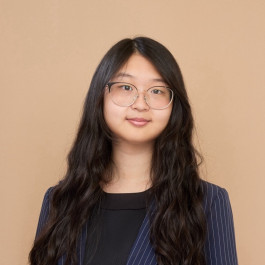
Serena Honekin (she/her) is a fourth-year undergraduate student studying psychology and sociology at the University of Toronto. Her areas of interest lies in the connection between class, culture, and inequality. Under the supervision of Professor Elizabeth Page-Gould, she is investigating how imagined intergroup contact between social classes may damper working-class collective support for structural social change. In between drawing inspiration from and building connections with others, Serena can be found filling her notion pages with reflections and recent reads
Lia Iannarilli
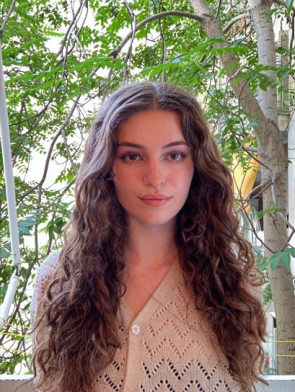
Lia Iannarilli (she/her) is an incoming fourth year student majoring in Political Science and English. She is interested in interdisciplinary research, and her project adopts a critical geographic analysis of Italian shorelines as a convergence of national identity, leisure culture, and politics. Under the supervision of Professor Ahmed Allahwala, her research explores Italian shorelines as sites of contested territoriality, where border policy, beach politics, and tourist economies intersect and are mobilized by far-right political discourse. By investigating Italian shorelines as negotiations of territorial and cultural control, she aims to recontextualize seemingly banal spaces of leisure within an urgent right-wing political climate.
Natalie Lau
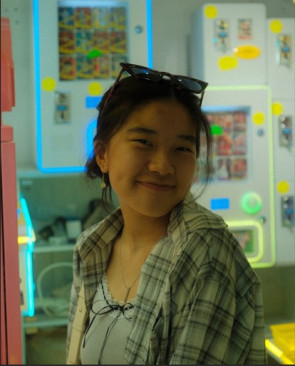
Natalie Lau (she/her) is a third-year student studying Criminology and Sociolegal Studies, History, and Political Science. Her research is about how growing authoritarianism on the one hand and tightening borders on the other create a growing class of political migrants stuck in limbo, focusing on two seemingly disparate cases: Hongkongers in Canada and Myanmar refugees in Thailand. Through collecting the oral histories of various stakeholders and actors, including exiled politicians, grassroots leaders, and laypeople of various backgrounds, her body of research seeks to preserve a historical and cultural memory of defiance.
Valerie Ng
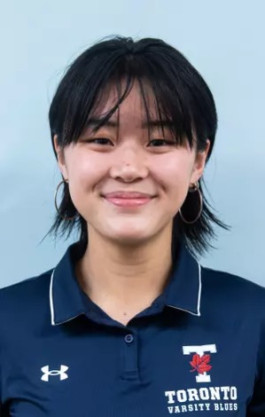
Valerie Ng (she/they) is an undergraduate student in Literature and Critical Theory at the University of Toronto. Her research project, The Body as a Cage: The Spatiotemporality of Being, undertaken under the supervision of Professor Maria Cichosz, investigates the body as a site of confinement, dislocation, and resistance across literature, film, and critical theory.
Through an autoethnographic methodology, the project integrates personal narrative with theoretical analysis to examine how cultural texts represent bodily estrangement, spatial-temporal fragmentation, and the affective dimensions of being situated in— and sometimes alienated from— one’s physical form. She is influenced by Maggie Nelson's seminal work The Argonauts, as well as post-structuralist thinkers such as Roland Barthes and Hélène Cixous. Culminating in a book-length manuscript, the project interrogates how dominant narratives shape the way bodies are read, regulated, and remembered.
Olivia Pontecorvo
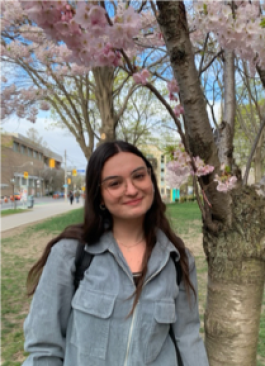
Olivia Pontecorvo (she/her) is a fourth-year undergraduate student majoring in Italian Studies with a double minor in Mediaeval Studies and Renaissance Studies. Supervised by Dr. Giulia Gaimari, her research project entitled Ritual Friendships: Liturgy, Emotion and Community Making in Dante studies the intersection of affect theory and the history of emotions in medieval literature. It explores the affective liturgical environment of the Middle Ages in Dante Alighieri’s works to understand how he depicted emotional bonding, friendship and community making. Olivia is also the Vice President of Academics for the Italian Student Association and co-founder of Riflesso: Undergraduate Journal of Italian Studies.
Bavan Pushpalingam (CSUS/NFC Undergraduate Fellow)
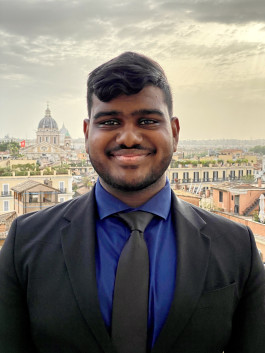
Bavan Pushpalingam (he/him/his) is an Eelam Tamil-Canadian scholar-activist and emerging researcher at the University of Toronto Scarborough, where he studies Public Policy with minors in Food Studies and Urban Public Policy and Governance. His research focuses on food security, food sovereignty and fair trade policies, with a particular emphasis on tea farmers in Sri Lanka and India, women-led agricultural movements in northern Ghana and racialized youth in Scarborough.
Melani Veveçka (CSUS/NFC Undergraduate Fellow)
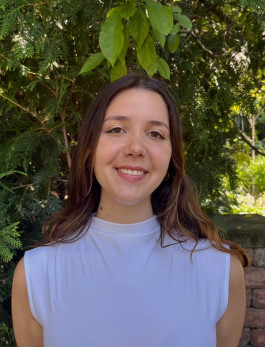
Melani Veveçka (she/her) is entering her fourth year at the University of Toronto, where she majors in Political Science and Evolutionary Anthropology. While she initially approached politics as a personal interest, by the latter half of her second year she had formally redirected her academic path toward political science, with a particular emphasis on American constitutional law and the evolving role of the Supreme Court. Her current research, conducted under the supervision of Dr. Delaney Glass in the Department of Anthropology, explores how interpretations of constitutional law have shaped bodily autonomy in the United States, with specific case studies on military conscription during the Vietnam War, LGBTQ+ rights, and reproductive freedoms. Outside of her academic work, Melani enjoys visiting art galleries, discovering new restaurants, and spending time with her kitten Georgie — named after George Orwell.
Visiting Fellows
The Northrop Frye Centre Visiting Fellows are scholars working on research projects in the humanities and interpretive social sciences. Visiting Fellows have access to the University of Toronto library system and the E.J. Pratt Library’s special collections. Visiting Fellows participate in the intellectual community at Victoria College and communicate the results of their own research in a public lecture organized by the Centre.
Affiliated Research Projects
-
The NFC will cover the residual wages for Work Study Research Assistants (normally one per project)
-
You will gain priority access to booking the Northrop Frye Centre (VC102) for research-related activities. If needed, the NFC will also offer administrative support for affiliated research projects.
This new digital project grows out of research conducted at the Archivio di Stato in Florence, Italy, which preserves documents illuminating enslaved people from 1366 to 1650. This time period covers the fullest Italian and European conception of the Renaissance period, great cultural wealth and political change in Florence, as well as the shift of the slave trade’s point of embarkation from Eastern Europe and North Africa to West Africa. Juxtaposing varied documents in a digital project using ArcGIS data layers, creates a chronological and geographic atlas of Florence’s most oppressed residents. This open-access project will reveal data patterns that expand earlier studies confined to a single document type, elite households, or narrow time period. In addition to mapping specific enslaved people in households through this period, Enslaved Florence will determine: how many enslaved people lived on a single street, parish, or quarter in a given time period? How many enslaved people joined a single household over centuries? How did the gender and age trends of enslaved people change over time? How large was the population of free people born of at least one enslaved parent? How did the patterns of child abandonment, “renting out,” and manumission change over time? There is no comparable project for an early modern city that strives to identify and map all enslaved people and over three centuries.
The exhibit restages a modernist play written and performed by the Varsity Veterans Association at Hart House Theatre in the 1920 inaugural season. The symposium will be held at Victoria College on November 16th, 2024, followed by the opening of an exhibit at the E.J. Pratt Library. No photos exist of the performance, but the never-before displayed script, stage directions and posters found in UTARMS will be included in the exhibit. The exhibit will display WWI diaries, photographs, ephemera, and objects held by the VIC Special Collections. A loan of artifacts like those used in the original play will be borrowed from the Royal Canadian Military Museum.
Past NFC Fellows
Since 2015, the Northrop Frye Centre has become a cross-generational community of scholars working in different disciplines in the humanities and social sciences.
Past Doctoral Fellows
2024-2025
Yizhou Zhang (Drama, Theatre & Performance Studies)
Bard Swallow (Medieval Studies)
Sajdeep Soomal (Department of History)
Marta Rocatin Centelles (Spanish & Portuguese)
Chris Aino Pihlak (CSUS/NFC Doctoral Fellow)
Lilika Ioki Kukiela (CSUS/NFC Doctoral Fellow)
2023-2024
Aliju Kim (East Asian Studies)
J Hughes (Department of English)
Kate Russell (Cinema Studies Institute)
Rhiannon Vogl (Department of Art History)
2022-23
Eriks Bredovskis (History)
Hong Liu (Comparative Literature)
Colleen McDonell (English)
Morgan Moore (Medieval Studies)
2021-22
Dur-e-Aden (Political Science)
Marina Dumont-Gauthier (Art History)
Nattapol Ruangsri (Italian Studies)
Filippo Sposini (IHPST)
2020-21
Catia Dignard (Spanish and Portuguese)
Patrick Marshall (Cinema Studies)
Tavleen Purewall (English)
Robert Twiss (Comparative Literature)
2019-20
Emily Doucet (Art History)
Billy Johnson (English)
Matthew Thompson (Cinema)
Roxanne Korpan (Religion and Book History and Print Culture)
2018-19
Nicholas Feinig (Anthropology)
Chiara Graf (Classics)
Carrie Reese (Cinema)
Christina Turner (English)
2017-18
Aleksa Alaica (Anthropology)
Beyhan Farhadi (Geography)
Marisa Karyl Franz (Religion)
William Fysh (History)
2016-17
Amy Fox (Anthropology)
Erica Petkov (Political Science)
Johanna Pokorny (Anthropology)
Julia Rombough (History)
2015-16
Katie Fry (Comparative Literature)
Alexandra Logue (History)
Emma Planinc (Political Science)
2014-15
Joanne Leow (English)
Colin Rose (History)
Morgan Vanek (English)
Past Undergraduate Fellows
Ariel Wang
Rick Wei
Milena Pappalardo
Kyra Menezes
Eunice Der
Noah Sokoloff
Joy Xu
2023-24
2020-21
Cheryl Cheung
Ori Gilboa
Lana Glozic
Kate Schneider
2019-20
Grace King
Kevin Yin
Leah Stephens
Maral Attar-Zadeh
Victoria McIntyre
Yilin Zhu
2018-19
Alexa Breininger
Aidan Flynn
Laura Harris
Veronika Korchagina
Alexandra Southgate
2017-18
Samantha Mazzilli
Sarah Ratzlaff
Benjamin Hillier-Weltman
Margaryta Golovchenko
Thomas Fraser
2016-17
Nika Gofshtein
Willem Alexander Crispin-Frei
Sofia Kavlin
2015-16
David Wang
Geoff Baillie
Amy Kalbun
Griffin Kelly
Vipasha Shaikh
Past Visiting Fellows
2024-25
Dr. Uxía Otero-González (University of Santiago de Compostela)
Dr. Yaser Farashahinejad (Elahé Omidyar Mir-Djalali Institute of Iranian Studies)
Dr. Paul Barrett (University of Guelph)
2023-24
Prof. William Conklin (University of Windsor)
Dr. Michel Mallet (Université de Moncton)
2020-21
Dr. Anastasiya Lyubas (Binghamton University)
2019-20
Prof. Claire Battershill (Simon Fraser University)
Dr. Marta Manzanares Mileo (University of Barcelona)
2018-19
Prof. Nandi Bhatia (University of Western Ontario)
Prof. Daniel Gallimore (Kwansei Gakuin University)
2017-18
Prof. Kevin James (University of Guelph)
2016-17
Prof. Edward Jones-Imhotep (York University)
2015-16
Prof. Thomas Willard (University of Arizona)

